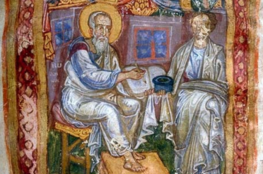And for this week I only have two suggestions since both are time intensive:
- Christopher Blosser, “Hutton [sic] on Feingold and Milbank,” Henri de Lubac, Thomas Aquinas and the Debate Over “Pure Nature” – Christopher Blosser has done a valuable service for Catholics (and non-Catholics!) interested in what one online acquaintance called the “Ur-debate in Catholic theology”: natura pura. While the post actually deals with Reinhard Hutter’s (not Hutton’s) thoughts on the quarrel between Lawrence Feingold and John Milbank, it’s entirely possible that Blosser’s use of “Hutton” is an intentional rib on Milbank’s apparent inability to get Feingold’s name correct. Anyway, that’s all beside the point. In addition to this informative post, the entire blog is packed with information (and links to more information!) on the natura pura controversy and the ongoing pushback against the “Lubacian consensus” that the concept of pure nature is little more than a theological corruption.
- John F. Manning, “Foreword: The Means of Constitutional Power,” 128 Harvard Law Review 1 (2014) – Since 2005, when I took a seminar on the Supreme Court, I have made it a point to read the Harvard Law Review‘s annual Supreme Court issue and the famous (sometimes infamous) “Forewords” which accompany them. While they typically have little to do with the actual Supreme Court term under review in the issue, some of them provide original theoretical insights into the Court and constitutional law. Many others, though, simply advance the pet moralism of their respective authors. This year’s contribution comes from John Manning, a reputed conservative legal scholar who has spent the bulk of his academic career defending a textualist approach to constitutional and statutory interpretation. In this piece, Manning — with detail that some might find excruciating — examines how the Court’s interpretative approaches affects the configuration of government while arguing that the Constitution supports greater judicial deference to Congress. If you’ve never read Manning, this is a good place to start; if you have read him, then there won’t be much here to surprise you.



